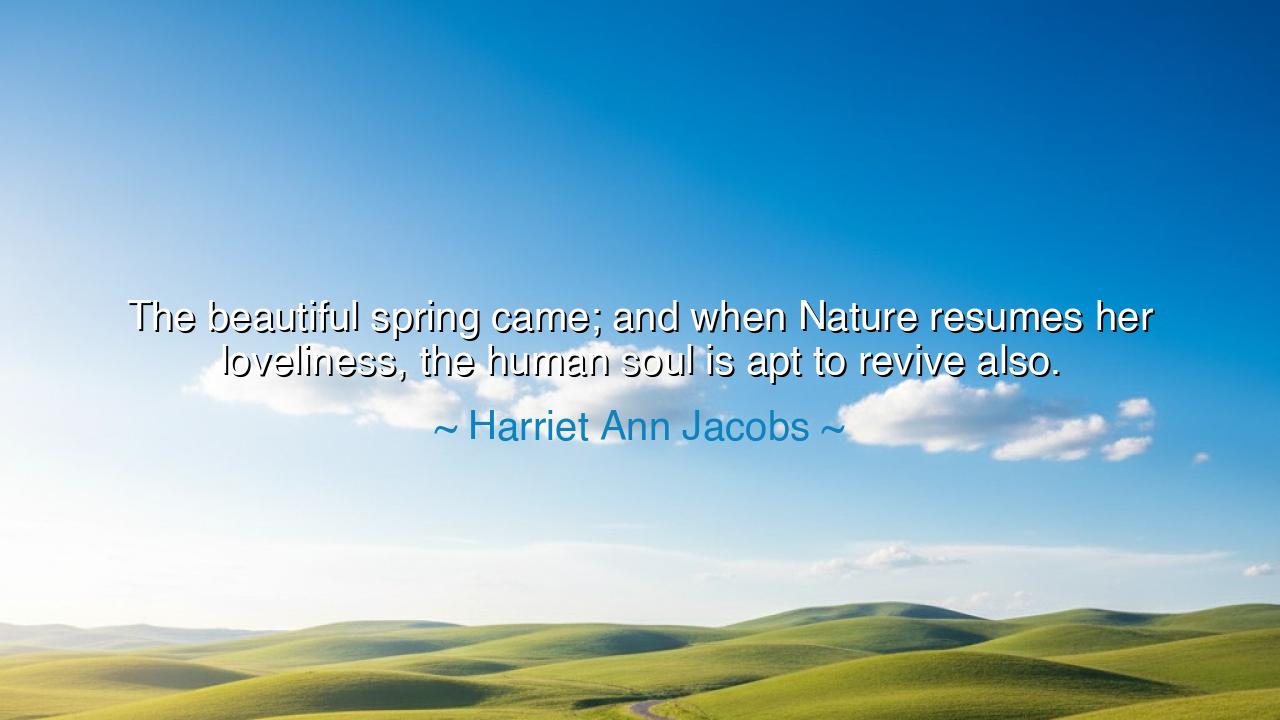
The beautiful spring came; and when Nature resumes her
The beautiful spring came; and when Nature resumes her loveliness, the human soul is apt to revive also.






The words of Harriet Ann Jacobs—“The beautiful spring came; and when Nature resumes her loveliness, the human soul is apt to revive also”—are a hymn to the eternal rhythm of renewal. They remind us that just as the earth shakes off the cloak of winter, so too does the spirit of man rise again from despair. In this springtime of the soul, the frozen griefs of yesterday melt away, and a hidden strength, long buried, awakens within. This quote is more than poetry; it is testimony, born of suffering and hope, for Jacobs herself endured the bitter winter of slavery and still found in Nature’s loveliness the promise of life reborn.
The origin of such wisdom lies in Jacobs’s own life. Enslaved from childhood, she suffered indignities that would crush the spirit of many. Yet even in hiding—seven years confined in a tiny attic crawlspace, barely able to stand—she clung to hope. She gazed upon the natural world through cracks in the wood, seeing the sunlight filter in, hearing the songs of birds, watching the seasons turn. For her, spring was not merely a change of climate, but a symbol that no winter of sorrow could last forever. Her words are thus not idle reflections, but the cry of one who endured darkness and found light.
Throughout history, others have borne witness to the same truth. When Europe staggered beneath the plague of the fourteenth century, whole towns were silenced, and despair spread like wildfire. Yet when the pestilence ebbed and the spring of recovery came, there arose an explosion of art, science, and faith, as if the very soul of mankind, long oppressed, now flowered in gratitude. The Renaissance itself can be seen as the human spirit reviving in harmony with the renewal of nature, for after every great winter of history, a spring must follow.
The emotional power of Jacobs’s words lies in the reminder that man is not separate from nature, but woven into its cycles. When trees bud and rivers swell with new waters, the human heart feels stirred, as though summoned to cast off despair. The frost of grief, though heavy, cannot withstand the warmth of light that returns each year without fail. In this we find a sacred promise: that no matter how deep our sorrows, life itself conspires to call us back to joy.
Her words also carry a quiet exhortation. Too often, burdened by toil or sorrow, men and women close their eyes to the changing seasons, failing to see the gift of renewal offered freely by the earth. But to notice spring’s loveliness—the song of a bird, the fragrance of blossoms, the gentle air—is to let the soul breathe again. It is to remember that life is not only a burden but also a blessing, continually offering us moments of resurrection.
The lesson for us is clear: when despair presses heavy, turn your eyes outward to the eternal rhythms of the earth. Just as Harriet Jacobs found hope in a sliver of sky, so can we find strength in the smallest signs of renewal—a sunrise after a sleepless night, the laughter of children in the street, the green shoot rising stubbornly from broken ground. These are nature’s sermons, proclaiming that endurance will be rewarded with revival.
What, then, shall we do? Let us walk more attentively through the seasons. Let us greet the return of spring not as mere weather but as a divine reminder that healing is always near. In our own lives, let us cultivate renewal: forgive where there has been bitterness, begin anew where there has been failure, and offer encouragement where others stagger. Just as the earth does not tire of blossoming each year, so must we not tire of beginning again.
Thus, Harriet Ann Jacobs speaks across time: that even in the coldest winters of the human condition—slavery, despair, or grief—there is always the promise of revival. Nature’s loveliness is not only beauty for the eye, but medicine for the soul. Whoever listens to its rhythm will learn patience, resilience, and hope, and will know that though sorrow lingers, spring will always come.






AAdministratorAdministrator
Welcome, honored guests. Please leave a comment, we will respond soon